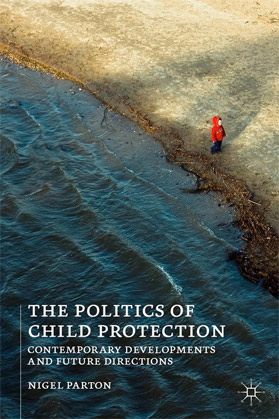Prof calls for new caring and responsive policies for child abuse

Wed, 02 Jul 2014 14:50:00 BST
“...the number of maltreated children in England could be as much as 90 per cent higher than official figures show...”
 THE number of maltreated children in England could be as much as 90 per cent higher than official figures show, claims a University of Huddersfield expert, the author of a wide-ranging new book on UK child protection policies.
THE number of maltreated children in England could be as much as 90 per cent higher than official figures show, claims a University of Huddersfield expert, the author of a wide-ranging new book on UK child protection policies.
Nigel Parton – who is Professor of Applied Childhood Studies at the University – calls for a broad-based, sensitive and responsive set of policies, in contrast to the “punitive set of interventions” that he argues have been adopted by the present government.
A series of well-respected “prevalence studies” – based on interviews – suggests that as few as 10 per cent of cases of child abuse come to the notice of official agencies, said Professor Parton, although the aftermath of the Jimmy Saville revelations has resulted in a greater readiness to talk about cases of abuse.
“The fact that it is now more possible for people to come forward must be seen as helpful. But I think Government grossly oversimplifies the nature of the problems and is increasingly taking a very punitive set of interventions that are likely to be short-term measures, not long-term solutions,” said Professor Parton, whose new book is The Politics of Child Protection, published by Palgrave Macmillan.
It examines the developments and changes of policies from the post-war years to the present day, with the impact of cases such as that of Baby P being analysed. Professor Parton’s roster of publications includes three other books dealing with official policy. The latest was Safeguarding Childhood in 2006. But there had been such sweeping changes since then that he realised a completely new book, rather than a revised edition, was needed.
 Government cuts in services
Government cuts in services
The formation of the Coalition Government in 2010 led to cutbacks in many services, such as Sure Start children’s centres and the axing of the broad-ranging initiative known as Every Child Matters. The changes were motivated by both austerity and ideology, according to Professor Parton.
“There were clearly agendas on social policy and in particular on children and family services,” he said, adding that there has also been greater emphasis on talking more children into care and a new emphasis on adopting children who have been in care.
“This country is quite exceptional in this. The evidence about the success of adoptions in such circumstances is patchy at best. It is certainly not a straightforward solution to a complex problem.
Most other European countries don’t adopt the way we do. This government is very keen on using adoption as a mainstream option for children that have been taken into care.
“I think the policy has been rushed and puts enormous pressures on the local authorities and the court system,” said Professor Parton.
He has recently paid a research visit to Australia, examining a system that incorporates aspects of the broader-based approach that he advocates. It operates under the aegis of an organisation named Families Australia and has similarities to England’s now-abandoned Every Child Matters policy.
“It requires people to talk and come forward at a much earlier stage rather than wait until the crisis occurs or becomes chronic, and it encourages professionals and organisations in the field to work closely together and to engage people at an earlier stage,” said Professor Parton.







